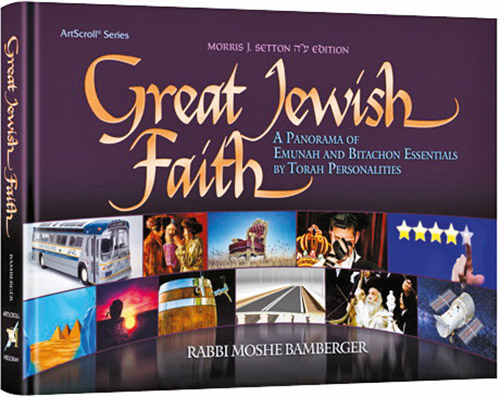
Q&A with Rabbi Moshe Bamberger, mashgiach ruchani at Touro’s Lander College for Men, shines rabbinic lessons on contemporary challenges, harnessing powerful quotes and exquisite graphics.
Highlighting: “Great Jewish Faith,” by Rabbi Moshe Bamberger. Mesorah Publications Ltd. 2022. Hardcover. 252 pages. ISBN-13: 978-1422632277.
(Courtesy of Artscroll) In his new book “Great Jewish Faith,” Rabbi Moshe Bamberger gathers wisdom from a millennium of Torah personalities to help navigate modern challenges with serenity and belief.
Rabbi Bamberger has served for over two decades as the mashgiach ruchani of Beis Medrash L’Talmud at Touro’s Lander College for Men.

What led you to write “Great Jewish Faith”? What do you hope the book will achieve?
This is the ninth book in my “Great Jewish” series published by Artscroll/ Mesorah. When choosing a topic for my books, I try to tap into a most pressing need of the time. Be it the pandemic, social unrest or financial instability, people are desperately seeking an anchor amid the turbulence. The one constant is Hashem, and we are yearning to connect to Him.
The book contains powerful sayings from rabbinic giants about faith that are set on dramatic photos, along with an accompanying short commentary about each particular quote.
How would you define emunah? How does it differ from bitachon?
This is the subject of great rabbinic debate. I like to follow the Ramban, or Nachmanides’ approach. He compares emunah to a tree and bitachon to the fruit of the tree. Emunah is understanding that Hashem exists and is present in our world. Bitachon is being able to implement that knowledge into real life. Emunah is theoretical, and bitachon is practical. When your faith is tested and challenged, do you still believe? In the Ramban’s words, “All who have bitachon have emunah, but not all who have emunah have bitachon.”
How do people relate to the concept of emunah in the modern world?
Emunah gives people the ability to see things through prism of God’s master plan, to find serenity knowing that we are in His loving and omnipotent hands. One of my favorite sayings in the book is from Rabbi Shimon Schwab, famed rabbi of Khal Adath Jeshurun in New York City. In his last address to his community, he cited the advertising slogan for the Greyhound Bus Company: “Go Greyhound – and leave the driving to us.” Rabbi Schwab applied that to our lives; We must relax and leave the driving to God. Rather than be constantly anxious when things are not going according to the script we wrote, we should say, “I’m not the driver, Hashem is.” While we must always do our hishtadlus, apply ample effort, to ensure success, we must take comfort in the knowledge that ultimately every result is based on the will of the Almighty. We should stay calm and try to enjoy the ride.
In your opinion, what are the character traits people need in order to meet life’s challenges?
Patience is a virtue that enables people to understand how Hashem operates. Sometimes we expect Him to function as we would, and assume that just like we try to help others immediately, He does the same. But Hashem implements His plan according to His schedule, and we must learn to be patient when awaiting the unfolding of His will. Happiness and positivity are also key traits to thrive in life. People who see the glass of life as being half-full will be able to meet their challenges with confidence and grace.
The book features a hashgachah pratis journal; how do you anticipate readers will use this and why was it included?
Years ago, Rabbi Moshe Feinstein and Rabbi Yaakov Kamenetsky co-signed a letter advocating that people keep a hashgacha pratis diary. Their idea was that chronicling episodes of Divine Providence in our own lives helps fortify our faith. When we keep a running journal, we notice modest events like getting a parking spot in midtown Manhattan or large ones like missing a plane that ended up never arriving at its destination. When we write down such occurrences in our daily lives, we can review these entries and say, “There really is a God in this world and He loves me!” By adding this section in my book, the reader becomes the writer; they will see a seamless transition between great quotes from noted rabbis about faith and trust, and the autobiographical experiences that shaped and fortified their own faith in the One Above.










